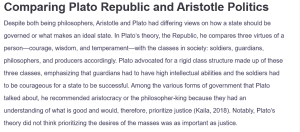Comparing Plato Republic and Aristotle Politics
Despite both being philosophers, Aristotle and Plato had differing views on how a state should be governed or what makes an ideal state. In Plato’s theory, the Republic, he compares three virtues of a person—courage, wisdom, and temperament—with the classes in society: soldiers, guardians, philosophers, and producers accordingly. Plato advocated for a rigid class structure made up of these three classes, emphasizing that guardians had to have high intellectual abilities and the soldiers had to be courageous for a state to be successful. Among the various forms of government that Plato talked about, he recommended aristocracy or the philosopher-king because they had an understanding of what is good and would, therefore, prioritize justice (Kaila, 2018). Notably, Plato’s theory did not think prioritizing the desires of the masses was as important as justice.
On the other hand, Aristotle’s theory in politics involves a more multifaceted evaluation of the interaction between the state and virtues as opposed to Plato’s theory. He argues that the telos of the state, which essentially is making sure humans flourish, should be the priority of the state. Aristotle recommends three forms of government—monarchy, polity, and aristocracy—where those in leadership must be able to deliberate well about what is good and beneficial for oneself and society, otherwise termed phronesis (Kaila, 2018). He emphasizes the importance of laws and the balance between the upper, middle, and lower social classes in order to avoid tyranny. Further, Aristotle disputes Plato’s argument that the quantity of rulers affects the quality of the state. Instead, he argues that the political telos of the state and the priority of the state is to help the citizens or the rulers achieve eudemonia, which is the deciding factor of the quality of the government.
Lastly, since he believed humans are defined more by their souls than their bodies, Plato held a rather progressive view on the role of women, whereby he believed that despite being weak biologically, women were just as intellectually capable as men (Brisson, 2012). As such, he believed that women should be given the same opportunities for education and leadership, including becoming philosopher-kings. Contrastingly, Aristotle had a more conservative view regarding women’s roles, which was the opposite of what Plato believed.
References
Brisson, L. (2012). Women in Plato’s Republic. Études platoniciennes, (9), 129-136.
Kaila, E. A. (2018). Character virtues and forms of government: Plato and Aristotle. In World Congress of Philosophy-WCP 2016: The Philosophy of Aristotle (pp. 114-123). Ionia Publications.
ORDER A PLAGIARISM-FREE PAPER HERE
We’ll write everything from scratch
Question
Writing Assignment #2–ln an one–page, two paragraph essay, compare and contrast Plato’s Republic to Aristotle’s Politics. You should pay particular
attention, but not exclusive attention, to which type of government each favors and why as well as to the role of
women. Due Date: September 19th. (L–S)

Comparing Plato Republic and Aristotle Politics

